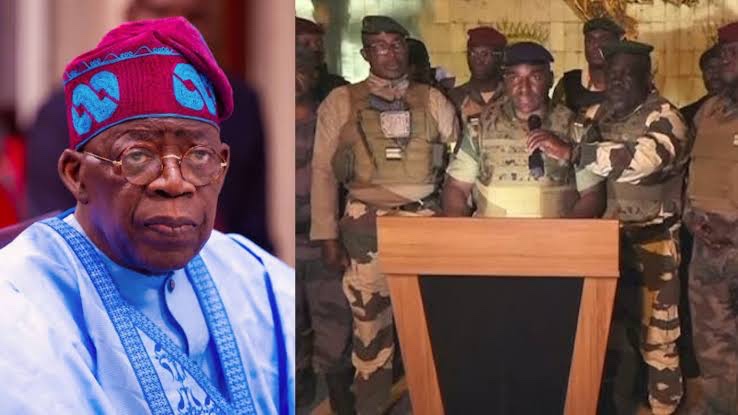Following the military coup in Gabon that ousted President Ali Bongo about 31 days after the Niger’s impasse, President Bola Tinubu, Wednesday said he is watchingg closely with deep concern for the country’s social-political stability and at the seeming autocratic contention apparently spreading across different regions of the beloved continent Africa.
The Gabon coup would be the right in West Africa the since 2020, the latest one, in Niger Republic, was in July and military officers have also seized power in Mali, Guinea, Burkina Faso and Chad, erasing democratic gains since the 1990s.
The ECOWAS Chairman in a statement by his spokesman, Ajuri Ngelale at the Presidential Villa, Abuja, said as a man who has made significant, personal sacrifices in his own life in the course of advancing and defending democracy is of the unwavering belief that power belongs in the hands of Africa’s great people and not in the barrel of a loaded gun.
Tinubu affirmed that the rule of law and a faithful recourse to the constitutional resolutions and instruments of electoral dispute resolution must not at any time be allowed to perish from our great continent.
“I am working very closely and continues to communicate with other Heads of States in the African Union towards a comprehensive consensus on the next steps forwards with respect to how the power in Gabon will play out and how the continent will respond to contagious autocracy we have seen spread across our continent,” the Nigerian President said.
Recall the military officers in oil-producing Gabon said they had seized power on Wednesday and had put President Ali Bongo under house arrest, stepping in minutes after the Central African state’s election body announced he had won a third term, against the wishes of the people.
Bongo’s family have ruled Garbon for 56 years, hence, the eruption of celebrations in the streets of Libreville the Gabon’s capital.
The officers who half-century represented the armed forces declared on television that the election results were cancelled, borders were closed and state institutions were dissolved, after a tense vote that was set to extend the Bongo family’s more than half-century in power.
One of the officers, Brice Oligui Nguema, who in a video appeared to be hailed as their leader, told French newspaper Le Monde that he and other generals would meet on Wednesday to select someone to head the transitional government.
Hundreds of people on the streets of the Gabonese capital celebrated the military’s intervention, while France, Gabon’s former colonial ruler which has troops stationed in the African nation, condemned the coup.
“I am marching today because I am joyful. After almost 60 years, the Bongos are out of power,” said Jules Lebigui, a jobless 27-year-old who joined crowds in Libreville.
